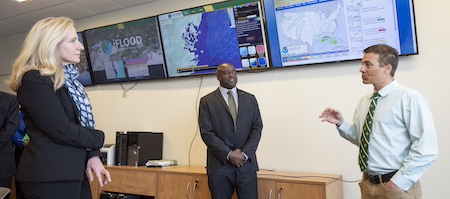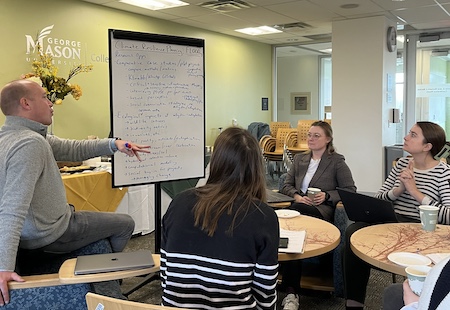George Mason University scientists and partners will leverage their climate expertise and the university’s resources into broader societal implications, thanks to a $6 million grant from the National Science Foundation (NSF) that is going to translate research into practice to support the creation of climate-resilient communities across Virginia.

The funding from the NSF’s Accelerating Research Translation (ART) program will allow Mason to expand its capabilities and capacity for translating research into real-world practical applications, with the creation of programming that will allow Mason faculty to serve communities across the commonwealth—especially within the state’s underserved regions—by co-producing science-based solutions that help them increase their resilience to climate change.
The four-year cooperative agreement, “ART: Translating Research to Practice to Create Climate-Ready Communities Across Virginia,” begins Feb. 1, and will allow Mason faculty and their nonprofit partner, the Center for Climate Strategies, to work with local municipal governments and community partners to produce science-based solutions that will create sustainable, community resilience to the impacts of climate change.
The project proposes two initial seed translational research projects, focusing on the co-production of solutions to mitigate flood hazards and reduce the impacts of urban heat on frontline communities. The latter comes on the heels of the world’s warmest year on record in 2023. Faculty will have the opportunity to propose additional translational research projects that address other climate impacts and response capabilities needed by Virginia communities to become climate-ready.

“This really gives universities a chance to have an impact,” said Leah Nichols, the project’s principal investigator and the executive director of Mason’s Institute for a Sustainable Earth. “I think it’s going to help us start to institutionalize things that until now had been one-offs.”
Mason was one of 18 schools to have been awarded an ART cooperative agreement. The NSF overall investment of more than $100 million will enable academic institutions to accelerate the pace and scale of translational research that will grow the nation's economy.
“NSF endeavors to empower academic institutions to build the pathways and structures needed to speed and scale their research into products and services that benefit the nation,” said NSF Director Sethuraman Panchanathan. “The [ART program] identifies and champions institutions positioned to expand their research translation capacity by investing in activities essential to move results to practice.”
Mason’s ART program leverages the model already created by the Virginia Climate Center (VCC)—which was initially established by a $2 million Community Project grant sponsored by Congressman Gerry Connolly (D-VA) – since its inception in 2022 for the necessary engagement infrastructure. That includes targeted outreach to individual community leaders and other key influencers in the hopes of creating the kind of collaborative relationships necessary to figure out what each community’s specific needs are.
Other co-PIs on the Mason project include Jim Kinter, a professor in the Climate Dynamics PhD Program and the director of both Mason’s Center for Ocean-Land-Atmosphere Studies within the College of Science and the Virginia Climate Center; Celso Ferreira, an associate professor within Mason’s College of Engineering and Computing and the director of the Flood Hazards Research Lab; Luis Ortiz, an assistant professor in the Department of Atmospheric, Oceanic and Earth Sciences within the College of Science; and Tom Peterson, the CEO of the Center for Climate Strategies. Other entities involved include MN Associates Inc., which will monitor’s the program’s implementation and progress, and the University of Kentucky, which is serving as the project’s mentoring institution. Pairing awardees with mentor institutions that have an established translational research ecosystem is one of the unique features of the ART program.
Current research that can be brought to bear on local community concerns includes, but is not limited to risk and vulnerability assessment, the development and deployment of new adaptive capacities through modeling, simulating, predicting and projecting climate variability and change, including downscaled global observational and modeling data sets, and the development of solutions to close vulnerability gaps by assessing needs for action and designing and evaluating new measures for local implementation.
Other aims include supporting faculty who wish to be involved and the creation of specific academic programming, such as specialized courses on key climate issues, a new climate action minor, and a graduate certificate program, for future workforce development.
“One very troubling aspect of the effects of climate change is that it has the biggest impact on underserved people and communities that are least able to address the issue,” Kinter said. “Mason, being the largest public university in Virginia, owes it to the residents of the commonwealth to understand the risks it faces and create innovative solutions to increase community resilience.”
Virginia bore the brunt of nine climate disasters in 2018 and 2019 alone, resulting in $1.6 billion of negative economic impact, according to the Secretary of Natural and Historic Resources.
Increasing community resilience to the effects of climate change is expected to help mitigate the impact and substantially reduce costs associated with damage from progressive climate change, extreme weather events, and other climate-driven effects, the researchers said.
“We’re really trying to understand what it is that [local communities] need from a scientific, technical, or research point of view through the lens of what is it that a university can provide,” Nichols said. “And once the climate-focused ART programs become well-established, we hope to extend this model to support the translation of research into practice in other sustainability domains as well.”
In This Story
Related News
- November 19, 2025
- November 1, 2024
- April 6, 2024
- January 23, 2024
- October 23, 2023
This content appears in the Summer 2024 print edition of the Mason Spirit Magazine with the title "Helping Virginia Communities become Climate Resilient."
